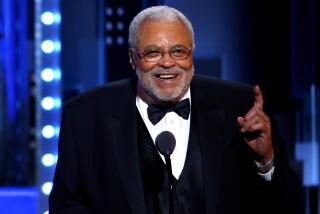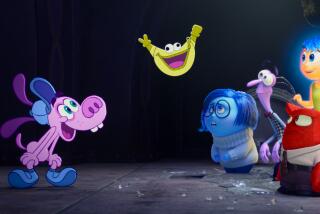Sterling Holloway, Voice of Disney Characters, Dies : Entertainment: Actor who made Winnie the Pooh speak also played country bumpkins in comedy films in the 1930s and ‘40s. He was 87.
- Share via
Sterling Holloway, whose gangly manner made him the quintessential country bumpkin in a series of comedy films and whose reedy voice proved ideal for several of Walt Disney’s most enduring animal characters, especially Winnie the Pooh, has died.
His agent, Kingsley Colton, said Monday his longtime client was 87 when he died Sunday of heart failure at Hospital of the Good Samaritan in Los Angeles.
Holloway had remained active until shortly before his death, Colton said, and several of his commercial voice-overs are still being heard on television.
Holloway, whose laconic vocabulary made for lengthy dialogue, was the clumsy soda jerk or village handyman in many movies of the 1930s and ‘40s. And he carried those mannerisms into TV as the co-star of “The Baileys of Balboa,” a 1964-65 cop comedy.
He also appeared regularly on “Hollywood Premiere,” “The Life of Riley” (as Waldo), the 1954-55 legal drama “Willy” and “Your Story Theatre.”
His film acting career had begun in the silent era with a series of short comedies.
The advent of talking pictures in 1928 left many featured players out of work, but not Holloway. Instead, his distinctive voice--which sounded as if he had chronic tonsillitis--brought him prosperity.
In the 1930s and ‘40s the lanky redhead was featured in “Gold Diggers of 1933,” “The Beautiful Blonde From Bashful Bend,” “Alice in Wonderland” (as the frog in the 1933 all-star version), “Maid of Salem,” “Of Human Hearts,” “The Blue Bird,” “Remember the Night” and many more.
In 1951 he was the Cheshire Cat in Disney’s animated version of “Alice” and more recently he was seen in “Batman” and “The Adventures of Huckleberry Finn.”
He also made several children’s recordings, including such perennial favorites as “Peter and the Wolf” and “The Sorcerer’s Apprentice.”
For one of his most memorable roles, that of the eternally honey-seeking bear Pooh, Holloway created a sweet and innocent childlike voice in four short films. Three of those were combined in the 1983 movie “The Many Adventures of Winnie the Pooh.” He also did the voice for Messenger Stork in “Dumbo.”
“Sterling just had a unique voice,” said Rick Dempsey, director of Disney animated voices. “It was a high-tenor, raspy voice unlike anything you heard. He was the first spoken teddy bear. That was a contradiction, unlike the ferocious bears out in nature.”
Holloway’s voice was also featured prominently in 1967’s “The Jungle Book,” the classic Disney animated musical. In that film, his snake character sang the memorable song “Trust in Me” as he hypnotized wolf boy Mowgli.
Holloway came from a distinguished theatrical background.
He graduated from Georgia Military Academy, studied at New York’s American Academy of Dramatic Arts and starred in the hugely successful “Garrick Gaieties,” musical revues that ran on Broadway during the late 1920s.
Richard Rodgers was in the pit conducting the songs he and Lorenz Hart had written. Holloway, also a successful dancer, introduced two of them: “Manhattan” in 1925 and “Mountain Greenery” in 1926.
Holloway next went to Hollywood where he succeeded commercially but grew weary of being typecast.
Richard Lamparski, in his series of “Whatever Became Of . . . ?” books, quotes him as saying: “I delivered so many telegrams and jerked so many sodas I got tired of it.”
When he was unable to land the parts he wanted, he went back on stage with the Pasadena Playhouse and Los Angeles Civic Light Opera before the Disney work revitalized his career.
He amassed a collection of contemporary art, much of which was considered of museum quality. During the 1960s and ‘70s when he lived in Laguna Beach, he spoke often on art and how to interest children in it.
In 1986, as he prepared to narrate yet another “Peter and the Wolf,” this one with the Garden Grove Symphony, he dismissed his career as “coming too easy.”
He was fortunate, he said, to have been been born with a boyish voice that never changed. But his dancing, he said, was another matter.
“Years ago when I started out in the theater, the critics would comment about my eccentric dancing. Actually all they were focusing on was my constantly blowing my hair out of my eyes. It took attention away from my feet. I still can’t do a time step.”
He is survived by his adopted son, Richard. Funeral arrangements are pending.
More to Read
Only good movies
Get the Indie Focus newsletter, Mark Olsen's weekly guide to the world of cinema.
You may occasionally receive promotional content from the Los Angeles Times.










